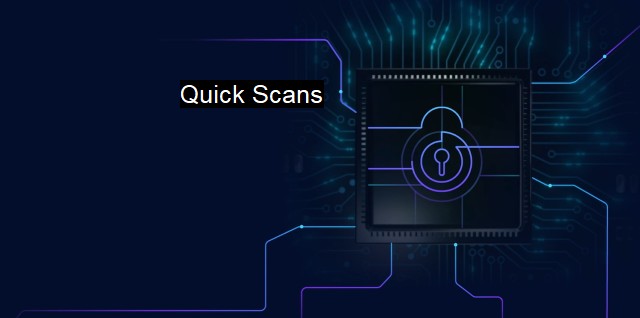What are Quick Scans?
Quick Scans: Essential Tools for Effective Cybersecurity and System Protection
Quick Scans refer to a streamlined cybersecurity process designed with the intent to identify potential threats proactively, confined to certain critical sections within a computing system that are most infectious. Given that our digital lives teeter precariously on the brink of a potential cybersecurity nightmare, Quick Scans are becoming increasingly critical due to their ability to provide rapid insights.In relation to cybersecurity and antivirus programs, A Quick Scan checks specific areas in your computer system where malware is most likely to infect. Its focus is on common locations like system memory, auto-run entries, hidden or system files, and other locations that are usually targets of malware and spyware. As technology has sped up, so too have potential threats, but this type of condensed scan acts as a protective shield to rectify vulnerabilities more efficiently.
While it is less intensive and not as thorough as full system scans, Quick Scans are resource-friendly; they consume less computer power, hard drive usage, and, most importantly, time. In an era of digital immediacy, these speedy inspections provide users the freedom to carry about their online presence without substantial interruption. This specific functionality that blends efficiency, speed, and strength doesn't downplay the ferocity of cybercrimes but instead philosophically recalibrates the concept of digital protection.
eThe evolution of Quick Scan technology has incredible implications, particularly for entities that require a harmonious blend of user flexibility and top-tier cybersecurity preventive measures. More so, they are perceived as one's first line of defense against potential malware or cyber threats, offering a tool that religiously checks for immediate threats, thereby protecting critical system areas.
Where prevention is the key, understanding that Quick Scans are not stand-alone solutions to cyber threats is crucial. They are a component in a robust cybersecurity protocol that, itself, should consist of multi-layered and real-time protections such as two-way firewalls, AI-powered antivirus systems, web and email protection modules, and security event correlation systems.
The ability of Quick Scans to sift swiftly through a mountain of files and directories and pick out malicious programs therein is outstanding. They use an intelligent antivirus engine enhanced with heuristic methodologies to spot even the sneakiest of malware. This swift sketch of the system status respects user space while not neglecting the essence of strong security protocols.
It's important not to misunderstand the application of Quick Scans. While efficacious andefficient at probing targeted locations for malware or threats, they are not intended to replace full-system scans nor aimed to catch all potential threats within a network. they're an efficient first step to threat detection, a process meant to rule out variants of malware, spyware, ransomware, phishing, and unintentional downloads stuffed with malvertising.
The beauty of Quick Scans lies not in replacing extensive security procedures but in complementing them. They act as a convenient pinch hitter when immediate security checks need to be conducted. This proves particularly useful during critical work times when intrusive, sluggish, full-system scans can hinder smooth workflows while compromising speed and digital momentum.
How antivirus software providers develop their quick scan technology can vary. Factors such as which directories and files are looked upon, as well as the time to execute the exercise, differ across the board. Regardless of the variations, the focus always lies on offering a versatile user experience without compromising the integral aspect of safety.
Quick Scans form an essential part of cybersecurity routines-the preliminary guards that stay alert to potential threats. With powerful antivirus tools, they lend fairness to the conflict between efficiency and robust threat screening. Albeit the limited scope, they reinforce the interactive front-end of digital security, keeping sentinel over the areas most susceptible to attacks, allowing users to perpetuate digital transitions with less worry and more empowerment.

Quick Scans FAQs
What is a quick scan?
A quick scan is a type of antivirus scan that checks your computer's memory and commonly infected areas for malware.How long does a quick scan take?
Depending on the size of your computer's memory and the speed of your processor, a quick scan can take anywhere from a few minutes to half an hour.Is a quick scan enough to protect my computer from viruses?
While a quick scan is a good way to check your computer for commonly known malware, it is not enough to protect your computer from all types of viruses. It's important to have a comprehensive antivirus program with real-time protection to keep your computer safe.Can I schedule a quick scan to run automatically?
Yes, most antivirus programs allow you to schedule a quick scan to run automatically at a time that's convenient for you. This way, you can ensure that your computer is regularly scanned for malware without having to manually initiate scans every time.| | A | | | B | | | C | | | D | | | E | | | F | | | G | | | H | | | I | | | J | | | K | | | L | | | M | |
| | N | | | O | | | P | | | Q | | | R | | | S | | | T | | | U | | | V | | | W | | | X | | | Y | | | Z | |
| | 1 | | | 2 | | | 3 | | | 4 | | | 7 | | | 8 | | |||||||